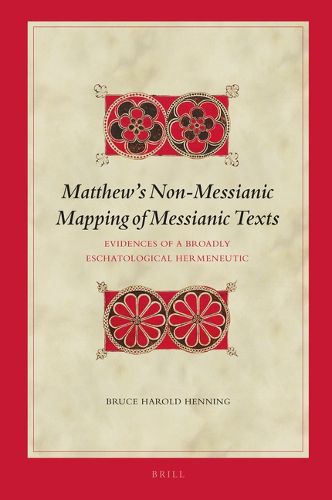Readings Newsletter
Become a Readings Member to make your shopping experience even easier.
Sign in or sign up for free!
You’re not far away from qualifying for FREE standard shipping within Australia
You’ve qualified for FREE standard shipping within Australia
The cart is loading…






Scholars often explain Matthew’s practice of applying non-messianic texts to the messiah by postulating a Christological hermeneutic. In Matthew’s Non-Messianic Mapping of Messianic texts, Bruce Henning raises the question of how Matthew appliesmessianic texts to non-messianic figures. This neglected category challenges the popular view by stretching Matthew’s paradigm to a broadly eschatological one in which disciples share in the mission of Jesus so as to fulfill Scriptural hopes. Using Cognitive Linguistics, this volume explores four case studies to demonstrate Matthew’s non-messianic mapping scheme: the eschatological shepherd, the vineyard care-giver, temple construction imagery, and the Isaian herald. These reveal how Matthew’s theology of discipleship as participating in Jesus’ own vocation extends even to his hermeneutical paradigm of fulfillment.
$9.00 standard shipping within Australia
FREE standard shipping within Australia for orders over $100.00
Express & International shipping calculated at checkout
Scholars often explain Matthew’s practice of applying non-messianic texts to the messiah by postulating a Christological hermeneutic. In Matthew’s Non-Messianic Mapping of Messianic texts, Bruce Henning raises the question of how Matthew appliesmessianic texts to non-messianic figures. This neglected category challenges the popular view by stretching Matthew’s paradigm to a broadly eschatological one in which disciples share in the mission of Jesus so as to fulfill Scriptural hopes. Using Cognitive Linguistics, this volume explores four case studies to demonstrate Matthew’s non-messianic mapping scheme: the eschatological shepherd, the vineyard care-giver, temple construction imagery, and the Isaian herald. These reveal how Matthew’s theology of discipleship as participating in Jesus’ own vocation extends even to his hermeneutical paradigm of fulfillment.